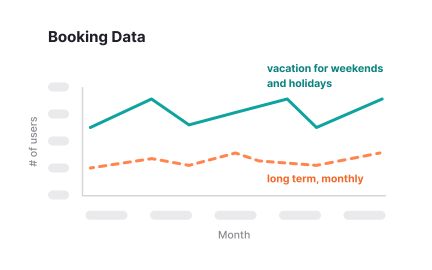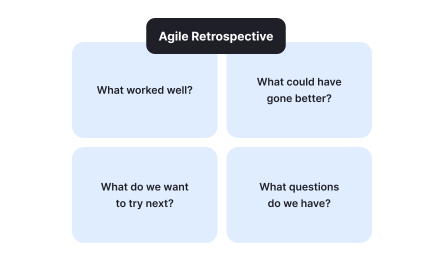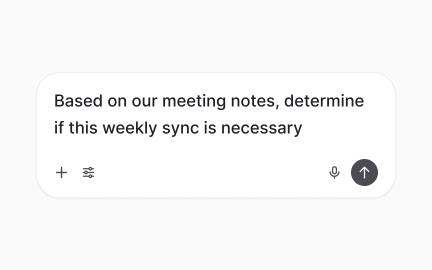Retrospective
A retrospective is a meeting where teams reflect on a recent sprint or project to identify wins, issues, and ideas for improvement.
What is Retrospective?
Your team repeats the same mistakes and misses improvement opportunities because you don't systematically reflect on project outcomes and process effectiveness, leading to stagnant performance and missed opportunities for optimization and learning.
Most teams complete projects without structured analysis of what worked well and what could be improved, missing crucial opportunities to enhance team performance and prevent recurring problems through systematic learning and process optimization.
A retrospective is a structured team reflection process that analyzes recent work periods or project outcomes to identify successes, challenges, and improvement opportunities, enabling continuous learning and systematic performance enhancement through collaborative problem-solving.
Teams conducting effective retrospectives achieve 45% better performance over time, 40% fewer recurring problems, and significantly improved team satisfaction because challenges are addressed systematically rather than repeating ineffective patterns without learning.
Think about how successful agile development teams use sprint retrospectives to continuously improve development processes, or how high-performing organizations use project retrospectives to extract learning that prevents future problems and optimizes team effectiveness.
Why Retrospectives Matter for Continuous Improvement
Your team performance stagnates because problems and inefficiencies persist without systematic identification and resolution, leading to repeated frustrations and missed opportunities for optimization that could improve productivity and satisfaction.
The cost of not conducting retrospectives compounds through every repeated mistake and missed improvement opportunity. You waste time on ineffective processes, repeat avoidable problems, and lose competitive advantage when teams don't learn and adapt systematically to improve performance.
What effective retrospectives deliver:
Better team performance and process optimization because systematic reflection identifies specific improvements that can be implemented rather than hoping performance will improve without addressing underlying process issues and team challenges.
When retrospectives are conducted effectively, teams actively solve problems rather than just accepting inefficiencies and frustrations as inevitable parts of work without improvement possibilities.
Enhanced team communication and collaboration through structured discussions that surface concerns and ideas in productive ways rather than letting frustrations build without resolution or improvement action.
Improved problem prevention and risk management because retrospectives identify patterns that lead to problems, enabling proactive prevention rather than reactive problem-solving after issues have already affected team performance.
Stronger team ownership and engagement as retrospectives empower teams to solve their own problems and optimize their work rather than just accepting processes and conditions without improvement agency.
More effective learning and knowledge retention through systematic documentation and application of lessons learned rather than informal learning that might not be retained or applied consistently.
Advanced Retrospective Meeting Methods
Once you've established basic retrospective capabilities, implement sophisticated team learning and improvement approaches.
Data-Driven Retrospectives and Performance Metrics: Use quantitative performance data to inform retrospective discussions rather than just subjective experience without objective measurement and trend analysis.
Cross-Team Retrospectives and Organizational Learning: Conduct retrospectives across multiple teams to identify systemic issues and improvement opportunities rather than just individual team optimization without organizational coordination.
Long-Term Retrospective Trends and Pattern Analysis: Track retrospective themes over time to identify recurring issues and improvement opportunities rather than just immediate period reflection without trend consideration.
Action-Oriented Retrospectives and Implementation Tracking: Focus retrospectives on implementation and results rather than just discussion, ensuring retrospective insights translate to actual team performance improvement and organizational learning.
Step 1: Establish Retrospective Structure and Safe Environment (Week 1)
Create systematic retrospective processes with clear agendas and psychological safety that encourage honest feedback rather than superficial discussions that don't address real problems and improvement opportunities.
This creates retrospective foundation based on productive problem-solving rather than just ritual meetings that might not generate actionable improvements and team development.
Step 2: Gather Comprehensive Data and Team Input (Week 1)
Collect information about team performance, project outcomes, and process effectiveness through multiple perspectives rather than just manager assessment without team input and diverse viewpoint consideration.
Focus data collection on factors that teams can actually influence rather than external conditions that might not be changeable through team action and process improvement.
Step 3: Identify Patterns and Root Causes (Week 1-2)
Analyze retrospective data to understand underlying causes of problems and successes rather than just surface-level issue identification without systematic understanding of improvement leverage points.
Balance comprehensive analysis with practical action planning to ensure retrospectives generate implementable improvements rather than just interesting discussions without follow-through.
Step 4: Develop Specific Improvement Actions and Implementation Plans (Week 2)
Create concrete action items with clear ownership and timelines rather than vague improvement goals that might not get implemented effectively or measured for progress.
Step 5: Follow Up on Improvement Implementation and Results (Week 2-3)
Track whether retrospective improvements actually enhance team performance rather than just identifying improvements without ensuring implementation and measuring effectiveness of changes.
This ensures retrospectives generate sustained improvement rather than just periodic reflection that doesn't create lasting team performance enhancement and learning application.
If retrospectives don't improve team performance, examine whether discussions focus on actionable improvements rather than just venting frustrations without constructive problem-solving and implementation planning.
The Problem: Retrospectives that become complaint sessions rather than constructive problem-solving discussions that generate actionable improvements and team development opportunities.
The Fix: Structure retrospectives around solution development rather than just problem identification, ensuring discussions generate implementable improvements and positive team development rather than just frustration venting.
The Problem: Retrospective improvements that don't get implemented due to lack of follow-through and accountability for action item completion and progress measurement.
The Fix: Create systematic follow-up processes and clear ownership for retrospective improvements rather than just identifying actions without ensuring implementation and measuring effectiveness.
The Problem: Retrospectives that focus on individual performance issues rather than process and system improvements that teams can control and optimize effectively.
The Fix: Focus retrospectives on team processes and collaboration rather than individual performance evaluation, ensuring discussions address factors teams can actually change and improve.
Create retrospective approaches that enhance team performance through systematic learning rather than just periodic meetings that don't generate sustained improvement and team development.
Recommended resources
Courses

Color Psychology

UX Writing








